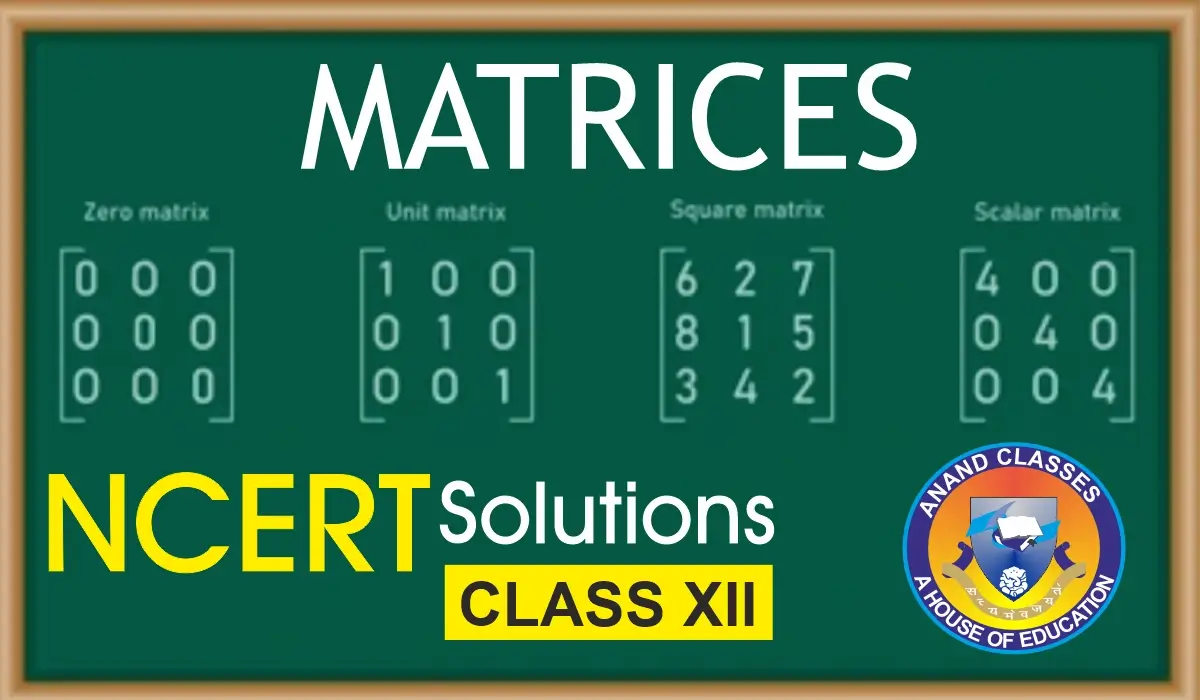Anand Classes provides a complete and free-downloadable PDF of NCERT Solutions for Class 12 Maths Chapter 9 – Differential Equations Exercise 9.1, carefully crafted to align with the latest CBSE syllabus and designed for clear understanding of key concepts like the order and degree of differential equations, general and particular solutions, and formation of differential equations. This resource from Anand Classes is ideal for Class 12 students who wish to strengthen their grasp of calculus topics and boost their performance in board exams. Click the print button to download study material and notes.
✅ Understanding Order and Degree of Differential Equation
For a differential equation:
- Order = Highest order of derivative present.
- Degree = Power of the highest order derivative only if the equation is polynomial in derivatives (i.e., no trigonometric, exponential, logarithmic functions of derivatives).
NCERT Solutions of Differential Equations Chapter-9 Exercise 9.1 Class 12 Math
NCERT Question 1 : Determine order and degree (if defined) of differential equation :
$$\frac{d^4 y}{dx^4} + \sin\left(y”’\right) = 0$$
Solution :
Given differential equation:
$$\frac{d^4 y}{dx^4} + \sin\left(y”’\right) = 0$$
✅ Order of a Differential Equation:
The order of a differential equation is the highest order of derivative present in the equation.
The highest order derivative present is $\displaystyle \frac{d^4 y}{dx^4}$
So, Order = 4
✅ Degree of a Differential Equation:
To determine the degree:
- The power of the highest order derivative, after removing any radicals or fractions, gives the degree.
- The differential equation must be a polynomial equation in its derivatives.
Degree is defined only when the equation is a polynomial in derivatives.
Since $sin(y”’)$ is a non-polynomial (trigonometric function of a derivative),
➡️ Degree is not defined
Perfect study material for Differential Equations — Anand Classes: Trusted for CBSE & JEE preparation!
NCERT Question 2 : Determine order and degree (if defined) of differential equation :
$$y’ + 5y = 0$$
Solution :
Given differential equation:
$$y’ + 5y = 0$$
✔ Order
The highest derivative present is $y’$.
So, Order = 1
✔ Degree
The derivative $y’$ is raised to power 1 and appears as a polynomial term.
So, Degree = 1
Boost your Differential Equations preparation with high-quality notes from Anand Classes — ideal for Class 11 & 12 students!
NCERT Question 3 : Determine order and degree (if defined) of differential equation :
$$\left(\frac{ds}{dt}\right)^4 + 3s \frac{d^2 s}{dt^2} = 0$$
Solution :
Given differential equation:
$$\left(\frac{ds}{dt}\right)^4 + 3s \frac{d^2 s}{dt^2} = 0$$
✔ Order
The highest order derivative present is
$$\frac{d^2 s}{dt^2}$$
So, Order = 2
✔ Degree
The highest order derivative $\dfrac{d^2 s}{dt^2}$ is raised to power 1.
So, Degree = 1
Master differential equations easily with Anand Classes study notes — perfect for scoring high in exams!
NCERT Question 4 : Determine order and degree (if defined) of differential equation :
$$
\left( \frac{d^2 y}{dx^2} \right) = \cos\left( \frac{dy}{dx} \right) = 0
$$
Solution :
Apply to Given Equation
$$
\left( \frac{d^2 y}{dx^2} \right) = \cos\left( \frac{dy}{dx} \right) = 0
$$
Step 1: Identify the highest derivative
- The highest derivative is:
$$
\frac{d^2 y}{dx^2}
$$
✅ So, order = 2
Step 2: Check for polynomial form
The differential equation contains:
- $cosleft( frac{dy}{dx} right)$ → trigonometric function of a derivative
This means the equation is not a polynomial in derivatives.
❌ When the equation is not polynomial in derivatives → degree is NOT defined
✅ Final Answer
- Order = 2
- Degree = Not defined
NCERT Question 5 : Determine order and degree (if defined) of differential equation :
$$ \dfrac{d^2 y}{dx^2} = \cos 3x + \sin 3x $$
Solution :
Given differential equation:
$$\frac{d^2 y}{dx^2} = \cos 3x + \sin 3x$$
✅ Order of a Differential Equation:
The order of a differential equation is the highest order of derivative present in the equation.
Here, the highest derivative present is:
$$\frac{d^2 y}{dx^2}$$
This is a second-order derivative.
➡️ Therefore, Order = 2
✅ Degree of a Differential Equation:
To determine the degree:
- The differential equation must be a polynomial equation in its derivatives.
- The power of the highest order derivative, after removing any radicals or fractions, gives the degree.
Here, $\dfrac{d^2 y}{dx^2}$ appears to the power 1 and the equation is polynomial in the derivative.
➡️ Therefore, Degree = 1
Final Answer:
- Order = 2
- Degree = 1
Enhance your CBSE & JEE preparation with clean and accurate MathJax formatted notes — exclusively crafted by Anand Classes for top-quality learning! 📘✨
NCERT Question 6 : Determine order and degree (if defined) of differential equation :
$$ (y”’ )^2 + (y”)^3 + (y’)^4 + y^5 = 0 $$
Solution :
Given differential equation:
$$ (y”’ )^2 + (y”)^3 + (y’)^4 + y^5 = 0 $$
✅ Order of a Differential Equation:
The order = the highest order derivative present in the equation.
Here, the highest derivative present is:
$$ y”’ $$
which is the third-order derivative.
➡️ Therefore, Order = 3
✅ Degree of a Differential Equation:
The degree = the power of the highest order derivative after removing radicals or fractional powers of derivatives.
Here, the highest derivative $y”’$ is raised to power 2:
$$ (y”’)^2 $$
This equation is already polynomial in derivatives — no simplification required.
➡️ Therefore, Degree = 2
Final Answer:
- Order = 3
- Degree = 2
Boost your exam performance with well-structured differential equations notes designed by Anand Classes — perfect for CBSE Board & JEE aspirants! 📚✨
NCERT Question 7 : Determine order and degree (if defined) of differential equation :
$$ y”’ + 2y” + y’ = 0 $$
Solution :
Given differential equation:
$$ y”’ + 2y” + y’ = 0 $$
✅ Order of Differential Equation
The order is determined by the highest order derivative in the equation.
Here, the derivatives present are:
- $y’$ (first order)
- $y”$ (second order)
- $y”’$ (third order)
The highest order derivative = $y”’$
➡️ Order = 3
✅ Degree of Differential Equation
The degree is the power of the highest order derivative, provided the equation is polynomial in nature with respect to its derivatives.
Here, $y”’$ is raised to power 1 (no fractions or roots).
➡️ Degree = 1
Final Answer:
- Order: 3
- Degree: 1
Master differential equations with structured revision notes and clear explanations — exclusively by Anand Classes for CBSE & JEE success! 🚀📚
NCERT Question 8 : Determine order and degree (if defined) of differential equation :
$$ y’ + y = e^x $$
Solution :
Given differential equation:
$$ y’ + y = e^x $$
✅ Order of the Differential Equation
The order of a differential equation is the highest order derivative present in the equation.
Here, the only derivative is:
- $y’$ (first order derivative)
So,
➡️ Order = 1
✅ Degree of the Differential Equation
The degree is the power of the highest order derivative, provided the equation is a polynomial in derivatives.
Here, $y’$ appears with power 1, and there are no radicals or fractions involving derivatives.
So,
➡️ Degree = 1
Final Answer:
- Order: 1
- Degree: 1
Enhance your exam preparation with clean and clear MathJax-formatted notes — perfect for CBSE Board and JEE students, curated by Anand Classes! 📘✨
NCERT Question 9 : Determine order and degree (if defined) of differential equation :
$$ y” + (y’)^2 + 2y = 0 $$
Solution :
Given differential equation:
$$ y” + (y’)^2 + 2y = 0 $$
✅ Order of the Differential Equation
The order is determined by the highest order derivative present.
Here, the derivatives are:
- $y’$
- $y”$ (highest)
So,
➡️ Order = 2
✅ Degree of the Differential Equation
The degree is the power of the highest order derivative, only if the equation is a polynomial in derivatives.
Here,
- Highest derivative: $y”$
- Its power: $1$
There is no fractional or radical form involving derivatives, so polynomial condition ⇒ valid.
Thus,
➡️ Degree = 1
✅ Final Answer:
- Order: 2
- Degree: 1
Get well-explained CBSE and JEE math notes with proper MathJax formatting — only at Anand Classes! 📚✨
NCERT Question 10 : Determine order and degree (if defined) of differential equation :
$$ y” + 2y’ + \sin y = 0 $$
Solution :
We are given the differential equation:
$$ y” + 2y’ + \sin y = 0 $$
✅ Order of the Differential Equation
The order is the highest order derivative present.
Here, the derivatives are:
- $y’$
- $y”$ (highest)
So,
➡️ Order = 2
✅ Degree of the Differential Equation
The degree is the power of the highest order derivative — only if the equation is a polynomial in derivatives.
In this equation:
- Highest derivative: $y”$
- Its power: $1$
However, we also notice one important point:
The term $\sin y$ does not contain a derivative, so it does not affect the degree.
Thus, the equation is still polynomial in derivatives.
So,
➡️ Degree = 1
✅ Final Answer
- Order: 2
- Degree: 1
Score high in board exams with well-explained differential equation notes — prepared for CBSE and JEE aspirants by Anand Classes! 🚀📘
NCERT Question 11 : The degree of the differential equation:
$$\left(\frac{d^2 y}{dx^2}\right)^3 + \left(\frac{dy}{dx}\right)^2 + \sin\left(\frac{dy}{dx}\right) + 1 = 0$$
Options:
(A) 3 (B) 2 (C) 1 (D) Not defined
Solution :
To determine the degree, we must check two conditions:
| Condition | Requirement |
|---|---|
| 1️⃣ | Equation must be a polynomial in derivatives |
| 2️⃣ | Then degree = Power of highest derivative |
Check Condition 1 :
The term:
$$\sin\left(\frac{dy}{dx}\right)$$
involves a trigonometric function of a derivative, which is not a polynomial.
✅ Since a sine function is present → the equation is not polynomial in derivatives.
Conclusion :
➡️ Degree cannot be defined
Correct Option: ✅ (D) Not defined
Master differential equations easily with well-structured notes — perfect for JEE and CBSE students at Anand Classes! 📘✨
NCERT Question 12 : The order of the differential equation
$$2x \cdot \frac{d^2 y}{dx^2} – 3\frac{dy}{dx} + y = 0$$
Options:
(A) 3 (B) 2 (C) 1 (D) Not defined
Solution :
A differential equation contains derivatives of a function.
The order of a differential equation is:
The highest order of derivative present in the equation.
Look at the derivatives in the given equation:
- First derivative: $$\frac{dy}{dx}$$
- Second derivative: $$\frac{d^2 y}{dx^2}$$ ✅ Highest derivative
Since the highest order derivative present is:
$$\frac{d^2 y}{dx^2}$$
➡️ The order of the differential equation is 2
✅ Correct Answer:
(B) 2
✨ Strengthen your understanding of Differential Equations with well-formatted study notes — ideal for CBSE Class 12 and JEE aspirants from Anand Classes!
Summary
Chapter 9 of the Class 12 NCERT Mathematics Part II textbook, “Differential Equations,” covers techniques for solving differential equations. Exercise 9.1 focuses on basic problems involving first-order differential equations, emphasizing methods such as separation of variables and integrating factors. The exercise aims to help students practice and apply these methods to find solutions to differential equations effectively.


